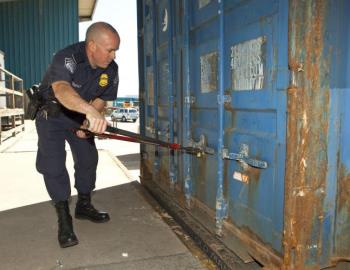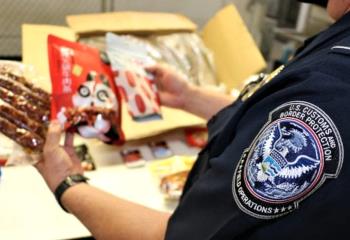The U.S. is now free of avian influenza and foot and mouth disease and has never been exposed to African swine fever. Introduction of any of these catastrophic diseases alone or in combination would stretch the resources of USDA-APHIS and result in considerable damage to hog, beef and poultry production and the U.S. economy.
 The U.S. along with all industrialized nations has imposed barriers at airports to prevent international travelers introducing raw or potentially contaminated cooked meat products in their luggage. CHICK-NEWS has frequently commented on the need for detection in arrival halls using the ‘Beagle Brigade’.
The U.S. along with all industrialized nations has imposed barriers at airports to prevent international travelers introducing raw or potentially contaminated cooked meat products in their luggage. CHICK-NEWS has frequently commented on the need for detection in arrival halls using the ‘Beagle Brigade’.
A second route of entry is illegal importation of commercial quantities of prohibited pork, chicken, beef and duck products from China. From April through early June of the current year, specialist assigned to the U.S. Customs and Border Protection Service intercepted close to 10 tons of prohibited meat items at the Long Beach Seaport. Smuggling was deliberate with products intermingled among a wide range of manufactured goods. Twelve shipments comprising 834 cartons were seized. The larger concern is how many illegal consignments were missed given the volume of smuggling that occurs. During the first five months of fiscal 2020 interception of contraband meats increased by 70 percent compared with the corresponding period in fiscal 2019.
Demand for exotic products from China by U.S. residents is driving this trade. Legislation is needed to impose heavy penalties on importers. Seizure and destruction at port of entry is an inadequate response.
The potential damage caused by contaminated meat products is illustrated by the foot and mouth outbreak in Great Britain twenty years ago. Illegally imported meat contaminated with virus was used  to prepare dishes at an ethnic restaurant located in Newcastle on Tyne. Swill from the restaurant was fed to backyard hogs resulting in an infection that took over a year to eradicate and even involved an extension to France. Given that African swine fever is endemic in China, and that ASF virus has been isolated from pork products smuggled by travelers to Australia, Thailand and Taiwan, the likelihood of commercial shipments introducing disease is highly likely.
to prepare dishes at an ethnic restaurant located in Newcastle on Tyne. Swill from the restaurant was fed to backyard hogs resulting in an infection that took over a year to eradicate and even involved an extension to France. Given that African swine fever is endemic in China, and that ASF virus has been isolated from pork products smuggled by travelers to Australia, Thailand and Taiwan, the likelihood of commercial shipments introducing disease is highly likely.
Following the adage that an ounce of prevention is worth a pound of cure, allocation of resources for detection and interdiction coupled with severe penalties for those illegally importing meat products should be intensified.